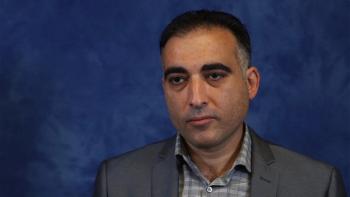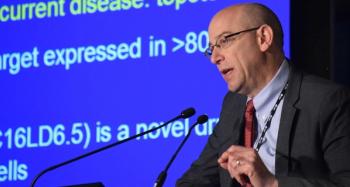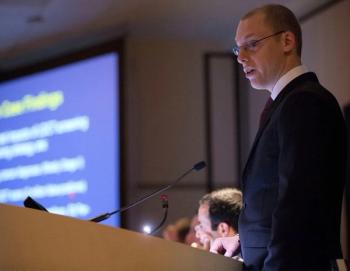
Activating oncogene mutations do not predict lung tumor responses to immune checkpoint blockade, ImmunoTarget investigators found.

Your AI-Trained Oncology Knowledge Connection!


Activating oncogene mutations do not predict lung tumor responses to immune checkpoint blockade, ImmunoTarget investigators found.

This video reviews pseudoprogression in non–small-cell lung cancer, including the incidence of this phenomenon and treatment considerations when it arises.

This video reviews the use of PD-L1 testing in selecting patients for frontline lung cancer treatment with pembrolizumab and examines which patients might not be appropriate for immunotherapy.

This video reviews immunotherapy options now available for the treatment of lung cancer across different lines of therapy.

This video highlights a study that tested an alternative maintenance strategy determined by response to induction chemotherapy for patients with advanced non-squamous non–small-cell lung cancer.

Treatment with nivolumab alone and in combination with ipilimumab resulted in durable responses in patients with previously treated small-cell lung cancer.

The use of prophylactic cranial irradiation (PCI) reduced the incidence of symptomatic and asymptomatic brain metastases in patients with radically treated stage III NSCLC. The therapy did not, however, improve overall survival, and decreased quality of life.

Lorlatinib exhibits durable responses in patients with ALK-positive non–small-cell lung cancer and robust intracranial activity in those with brain metastases.

Immunotherapy may represent an effective new treatment approach for relapsed mesothelioma patients, according to a new study.

Atezolizumab treatment beyond progression might benefit patients with advanced non–small-cell lung cancer, according to the first report from the randomized phase III OAK trial.

Dacomitinib delayed progression of EGFR-positive non–small-cell lung cancer, but led to more adverse events compared with gefitinib.

Ahead of the 2017 ASCO Annual Meeting, we discuss how to approach treatment for older patients with lung cancer.

Adjuvant gefitinib significantly prolonged time to recurrence compared with the standard of care for patients with NSCLC with EGFR-activating mutations.

The TKI brigatinib offered good response rates in a phase II trial of patients with ALK-positive non–small-cell lung cancer whose disease progressed on crizotinib.

A Web-based application allows for earlier detection of relapse among patients with advanced lung cancer, improving survival by 7 months.

Post-treatment CT surveillance does not offer better survival rates vs clinical symptoms evaluation for tumor recurrence in locally advanced non–small-cell lung cancer.

Testing for T790M mutations with plasma and urine assays can complement testing done from biopsy tissue in patients with EGFR TKI-resistant NSCLC.

The novel anti-PD-L1 agent avelumab showed some promising clinical activity and was generally well tolerated in a phase I trial of patients with unresectable, previously treated mesothelioma.

An antibody-drug conjugate, rovalpituzumab tesirine, shows promising efficacy against recurrent small-cell lung cancer.

A targeted-sequencing gene panel that includes EGFR, KRAS, PIK3CA, and other mutations from circulating tumor DNA detects stage I non–small-cell lung cancer and might outperform existing tumor markers.

Elderly patients with stage III non–small-cell lung cancer experience poorer overall survival than patients younger than age 70 years when treated with standard concurrent chemoradiotherapy, according to a pooled analysis.

In this interview we discuss the requirements for the effective implementation of a lung cancer screening program.

From the 2014 ASCO Annual Meeting, this internationally renowned lung cancer expert discusses oncogenic driver mutations in lung cancer.

This slide show highlights some of the top studies and news on lung cancer to come out of the 2014 American Society of Clinical Oncology (ASCO) Annual Meeting, held in Chicago.

The addition of the anti-EGFR antibody necitumumab to gemcitabine-cisplatin chemotherapy resulted in a modest but significant benefit to patients with stage IV squamous cell non-small-cell lung cancer, according to results of the SQUIRE study presented at ASCO.

The addition of bevacizumab to erlotinib as first-line therapy yielded a significantly extended progression-free survival in patients with advanced EGFR-mutation-positive non-small-cell lung cancer (NSCLC), according to a new phase II study.

Thoracic radiotherapy along with prophylactic cranial irradiation (PCI) significantly prolonged progression-free and overall survival in patients with extensive-stage small-cell lung cancer, according to results of a new study presented at ASCO.

The addition of the MET-targeting antibody onartuzumab to erlotinib added no benefit, and may have been detrimental, to patients with MET-amplified stage IIIb/IV metastatic non–small-cell lung cancer, according to a new phase III trial.

As part of our coverage of the 2014 ASCO Annual Meeting, we discuss chemotherapy's curative role in treating lung cancer.

Implementation of a national lung cancer screening program using low-dose CT will identify almost 55,000 additional lung cancer cases over 5 years, but will add $9.3 billion to Medicare expenditures.